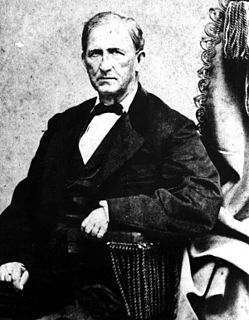 W
WAbraham Kurkindolle Allison was a Florida businessman and politician. He served in the Florida Territorial Legislature and the Florida State House of Representatives. He served as the sixth Governor of Florida, at the end of the American Civil War.
 W
WJames Patton Anderson was an American physician, lawyer, and politician, most notably serving as a United States Congressman from the Washington Territory, a Mississippi state legislator, and a delegate at the Florida state secession convention to withdraw from the United States. He also served in the American Civil War as a general in the Confederate States Army, serving in the Army of Tennessee.
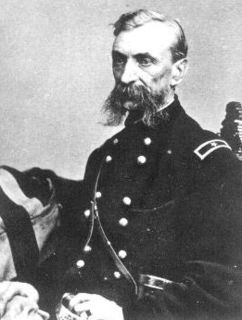 W
WAlexander "Sandor" Asboth was a Hungarian military leader best known for his victories as a Union general during the American Civil War. He also served as United States Ambassador to Argentina and as United States Ambassador to Uruguay.
 W
WJames McNair Baker was a lawyer, politician, and Senator from Florida in the Confederate Congress during the American Civil War.
 W
WLiberty Billings was an officer in the Union Army, a Unitarian minister, and a state senator. An African-American, he served as a Union Army officer during the American Civil War. He was a Radical Republican during the Reconstruction Era and served as a state senator in Florida. He was involved in the constitutional convention that developed the 1868 Florida Constitution. Billings has been honored posthumously as a Great Floridian. He was the second in command of the 1st South Carolina Volunteer Infantry Regiment.
 W
WRobert Bullock was a United States Representative from Florida and a brigadier general in the Confederate States Army. He was born in Greenville, North Carolina where he attended the common schools. He moved to Fort King, Florida in 1844 which was then a United States Government post, near the present city of Ocala, Florida. He taught in the first school in Sumter County, Florida. He served as clerk of the circuit court of Marion County, Florida from November 13, 1849, to November 11, 1855.
 W
WWilkinson Call was an American lawyer and politician who represented Florida in the United States Senate from 1879 to 1897.
 W
WRobert Hamilton McWhorta Davidson was a U.S. Representative from Florida.
 W
WJohn Jackson Dickison, known as J. J. Dickison, was an officer in the Confederate States Army during the American Civil War. Dickison is mostly remembered as being the person who led the attack which resulted in the capture of the Union warship USS Columbine in the "Battle of Horse Landing". This was one of the few instances in which a Union warship was captured by land-based Confederate forces during the Civil War and the only known incident in U.S. history where a cavalry unit sank an enemy gunboat. Dickison and his men were victorious in all of his raids against the Union troops in Florida, including his raid in Gainesville what is known as the Battle of Gainesville. Tragedy struck Dickison, when one of his sons, both of whom served under his command, was killed during a raid.
 W
WJoseph Finegan, sometimes Finnegan, was an Irish-born American businessman and brigadier general for the Confederate States Army during the American Civil War. From 1862 to 1864 he commanded Confederate forces operating in Middle and East Florida, ultimately leading the Confederate victory at the Battle of Olustee, the state's only major battle. He subsequently led the Florida Brigade in the Army of Northern Virginia until near the end of the war.
 W
WJesse Johnson Finley was a brigadier general in the Confederate States Army during the American Civil War. He was also a member of the United States House of Representatives from Florida, following the reconstruction era; the mayor of Memphis, Tennessee; an volunteer officer in the United States Army during the Second Seminole War; a member of the Arkansas Senate; a member of the Florida Senate; and a Circuit Court Judge in Florida.
 W
WJohn B. Galbraith, also known as J. B. Galbraith, was an American politician from Florida. Galbraith served as the Florida Attorney General during the American Civil War.
 W
WJames Gettis was a lawyer and judge in Tampa, Florida. He was the second lawyer in Tampa. Gettis was also a city councilman, and state representative, and the first town clerk.
 W
WHubbard L. Hart was an American entrepreneur who ran the most prominent steamboat line in Florida. He augmented his business with hotels, orange groves and lumber mills, and is noted for helping the state develop as a tourist destination.
 W
WWilliam Benton Henderson was a cattleman, merchant, and prominent figure in the history of Tampa, Florida. He is the namesake of Henderson Boulevard and Henderson Avenue as well as the former W. B. Henderson Elementary School.
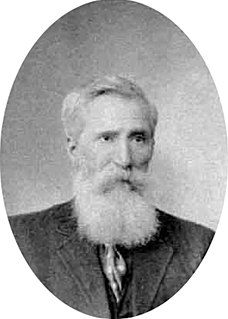 W
WIra Hough was a Union Army soldier during the American Civil War. He received the Medal of Honor for gallantry when he captured an enemy flag during the Battle of Cedar Creek fought near Middletown, Virginia on October 19, 1864. The battle was the decisive engagement of Major General Philip Sheridan's Valley Campaigns of 1864 and was the largest battle fought in the Shenandoah Valley.
 W
WValentine Mason Johnson was a professor of mathematics and the Superintendent of the West Florida Seminary during the American Civil War. Johnson was born in Spotsylvania County, Virginia and was an 1860 graduate of the Virginia Military Institute. Johnson died in Mountville, Virginia.
 W
WDavid Lang was a land surveyor, Confederate States Army officer during the American Civil War, civil engineer, and Florida politician.
 W
WJohn Thomas Lesley was a cattleman and pioneer in Tampa, Florida. He fought in the Third Seminole War and was a captain in the Confederate Army during the Civil War. Lesley formed his own volunteer company the "Sunny South Guards", and commanded the "Cow Cavalry", until he was wounded and replaced by W. B. Henderson. After the war he became a state senator.
 W
WRear Admiral David B. Macomb, USN was an admiral and engineering officer of the United States Navy. He served on blockade duty during the Civil War, and was also a noted inventor.
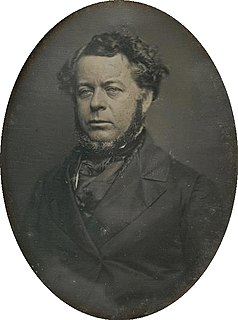 W
WStephen Russell Mallory was a Democratic senator from Florida from 1851 to the secession of his home state and the outbreak of the American Civil War. For much of that period, he was chairman of the Committee on Naval Affairs. It was a time of rapid naval reform, and he insisted that the ships of the US Navy should be as capable as those of Britain and France, the foremost navies in the world at that time. He also wrote a bill and guided it through Congress to provide for compulsory retirement of officers who did not meet the standards of the profession.
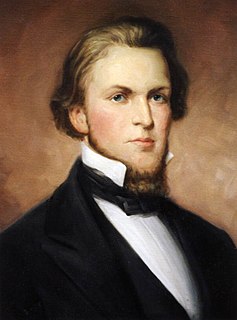 W
WAugustus Emmet Maxwell was an American lawyer and politician. Maxwell served in a number of political positions in the State of Florida including as one of Florida's Senators to the Confederate States Congress, Florida Secretary of State, and as Chief Justice of the Florida Supreme Court.
 W
WJames McQueen McIntosh was a career American soldier who served as a brigadier general in the Confederate Army during the Civil War. Noted as an aggressive and popular leader of cavalry, he was killed in action at the Battle of Pea Ridge.
 W
WWilliam Miller was an American soldier, attorney, timberman, and politician. He served as a general in the Confederate States Army during the American Civil War. One of the few Northern-born Confederate generals, he led the reserve troops of the state of Florida and helped win one of the South's last victories of the war at the Battle of Natural Bridge.
 W
WJohn Milton was governor of Florida through most of the American Civil War.
 W
WJackson Morton was an American politician. A member of the Whig Party, he represented Florida as a U.S. Senator from 1849 to 1855. He also served as a Deputy from Florida to the Provisional Congress of the Confederate States from 1861 to 1862.
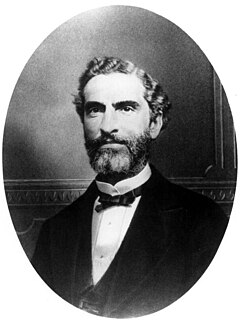 W
WMariano D. Papy, also known as M. D. Papy, was an American planter, attorney, and politician from the state of Florida. Papy served as the 5th Florida Attorney General from 1853 to 1861.
 W
WEdward Aylesworth Perry was a general under Robert E. Lee during the American Civil War and the 14th Governor of Florida.
 W
WMadison Starke Perry was the fourth Governor of Florida.
 W
WLewis Thornton Powell, also known as Lewis Payne and Lewis Paine, was an American Confederate soldier who attempted to assassinate William Henry Seward as part of the Lincoln assassination plot. Wounded at the Battle of Gettysburg, he later served in Mosby's Rangers before working with the Confederate Secret Service in Maryland. John Wilkes Booth recruited him into a plot to kidnap Lincoln and turn the president over to the Confederacy, but then decided to assassinate Lincoln, Seward, and Vice President Andrew Johnson instead, and assigned Powell the task to kill Seward.
 W
WGeorge Pettus Raney was an American attorney and politician who served as the 9th Chief Justice of the Florida Supreme Court.
 W
WGeorge Washington Scott was a noted Florida businessman, planter, and military officer in the Confederate States Army during the American Civil War.
 W
WEdmund Kirby Smith was a career United States Army officer who fought in the Mexican–American War. He later joined the Confederate States Army in the Civil War, and was promoted to general in the first months of the war. He was notable for his command of the Trans-Mississippi Department after the fall of Vicksburg to the United States
 W
WWilliam Stephen Walker was a Confederate States Army brigadier general during the American Civil War. He was born in Pittsburgh, Pennsylvania but was raised by Robert J. Walker, his uncle, who was a Secretary of the Treasury and U.S. Senator. Walker served as a first lieutenant in the United States Army during the Mexican–American War from 1847 to 1848. He was discharged in 1848. Walker rejoined the army as captain in the 1st U.S. Cavalry Regiment on March 3, 1855 and served until he resigned on May 1, 1861. Walker was wounded in the left arm and lost his left foot during the Battle of Ware Bottom Church during the Overland Campaign. After the war, he lived at Atlanta, Georgia.
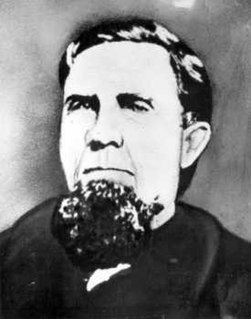 W
WGeorge Taliaferro Ward was a major cotton planter and politician from Leon County, Florida. He served in the Confederate Army as a colonel during the American Civil War, dying near Williamsburg, Virginia.
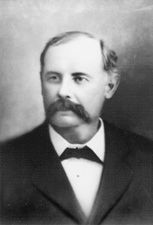 W
WJames Diament Westcott, III, also known as James Diament Westcott, Jr., was an American politician from the state of Florida who served as the 19th Justice of the Florida Supreme Court.
 W
WWilliam Henry Whitaker (1821–1888) was an American Seminole War veteran and pioneer who, under the provisions of the Armed Occupation Act, established the first permanent settlement in what is now Sarasota, Florida. There he traded mullet with Cubans to bring the first groves of economically important oranges to the state. He later married Mary Jane Wyatt and with her raised Nancy Whitaker, the first child recorded in what now is the county of Sarasota and a family of eleven children. His father-in-law, William Wyatt, was a constitutional delegate who helped to originate, and signed, Florida's first constitution. At the end of the Civil War he helped Judah P. Benjamin escape to London.
 W
WDavid Levy Yulee was an American politician and attorney. Born in St. Thomas, then under British control, he was of Sephardi Jewish ancestry: his father was from Morocco and his mother from Europe. The family moved to Florida when he was a child, and he grew up there on their extensive lands. He later served as Florida's territorial delegate to Congress. Yulee was the first person of Jewish ancestry to be elected and serve as a United States Senator, serving 1845–1851 and again 1855–1861. He founded the Florida Railroad Company and served as president of several other companies, earning the nickname of "Father of Florida Railroads." In 2000 he was recognized as a "Great Floridian" by the state.